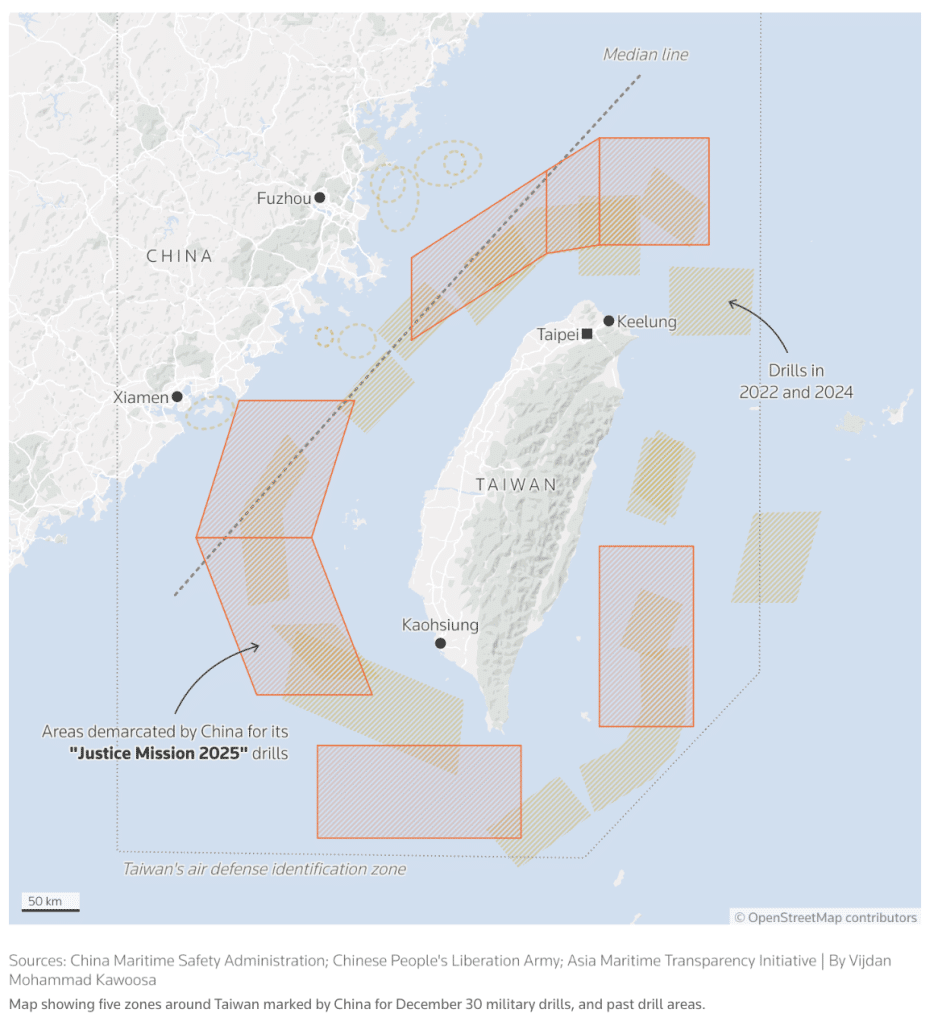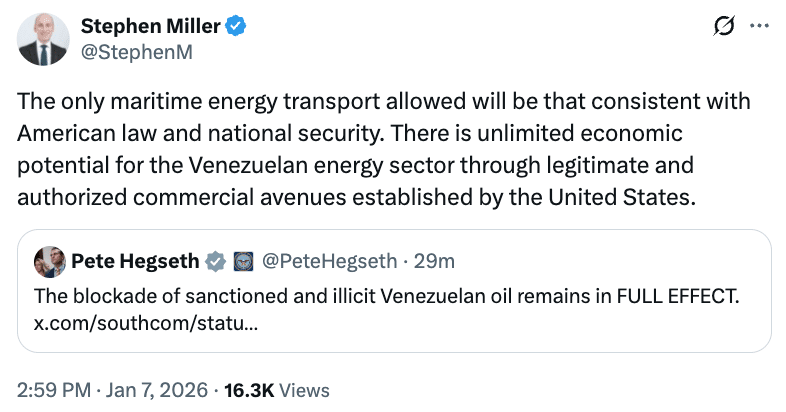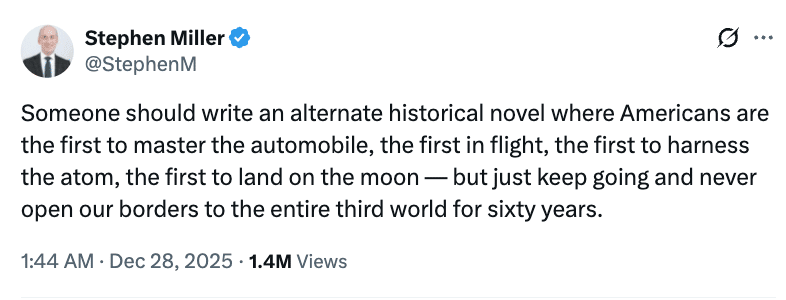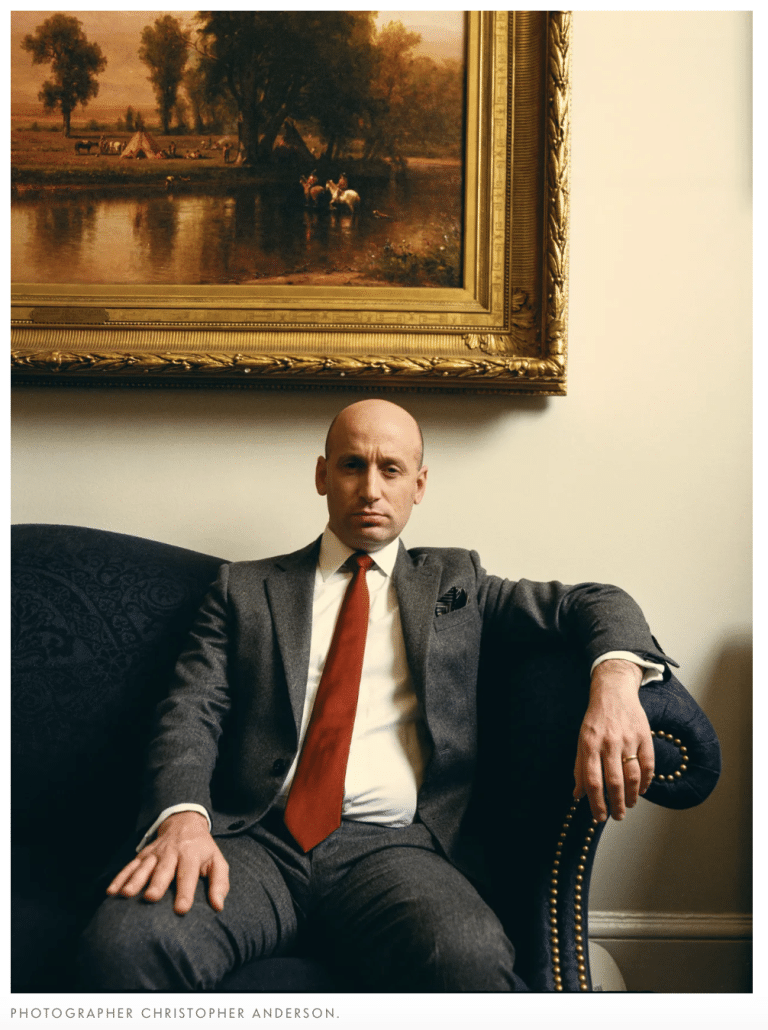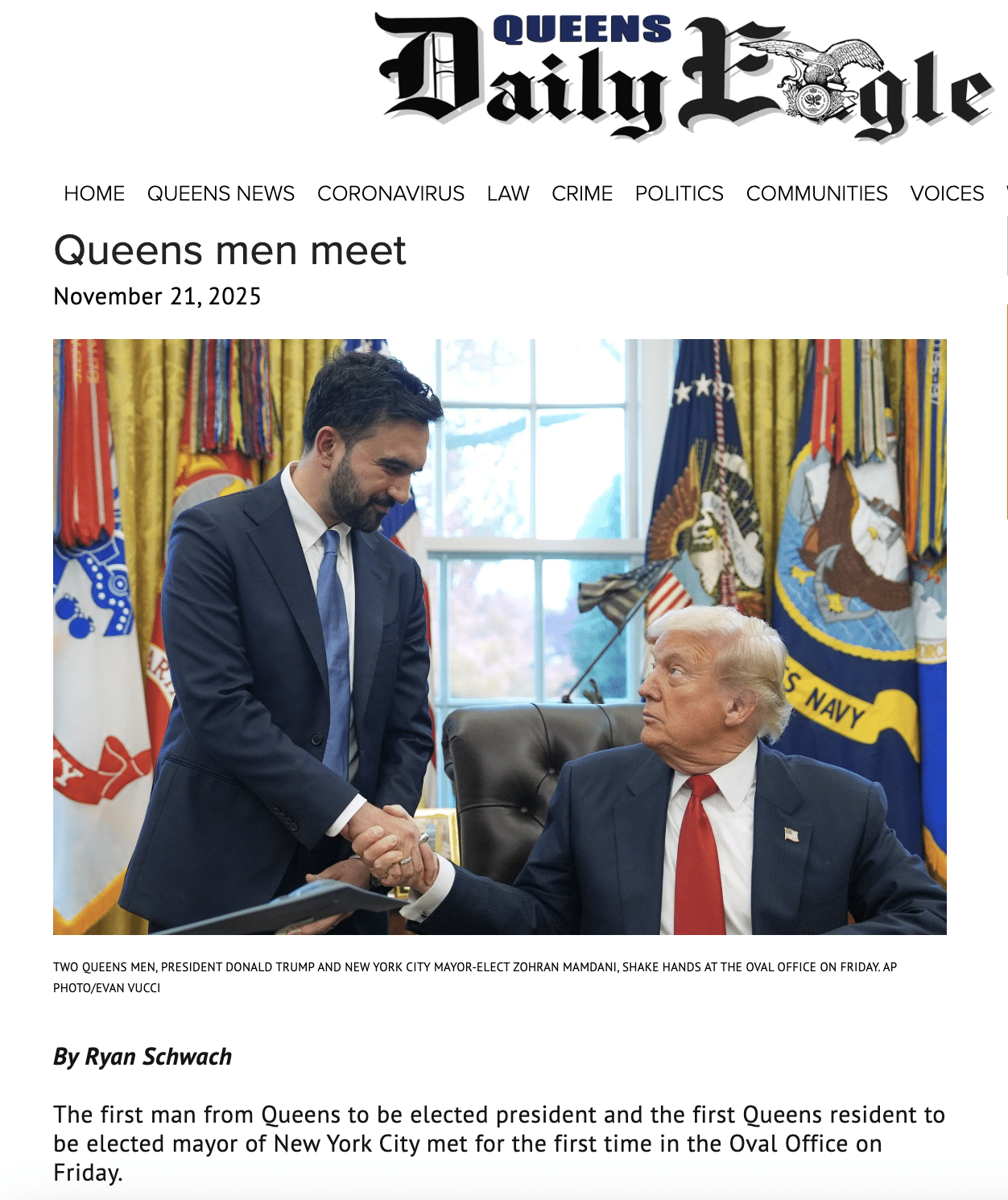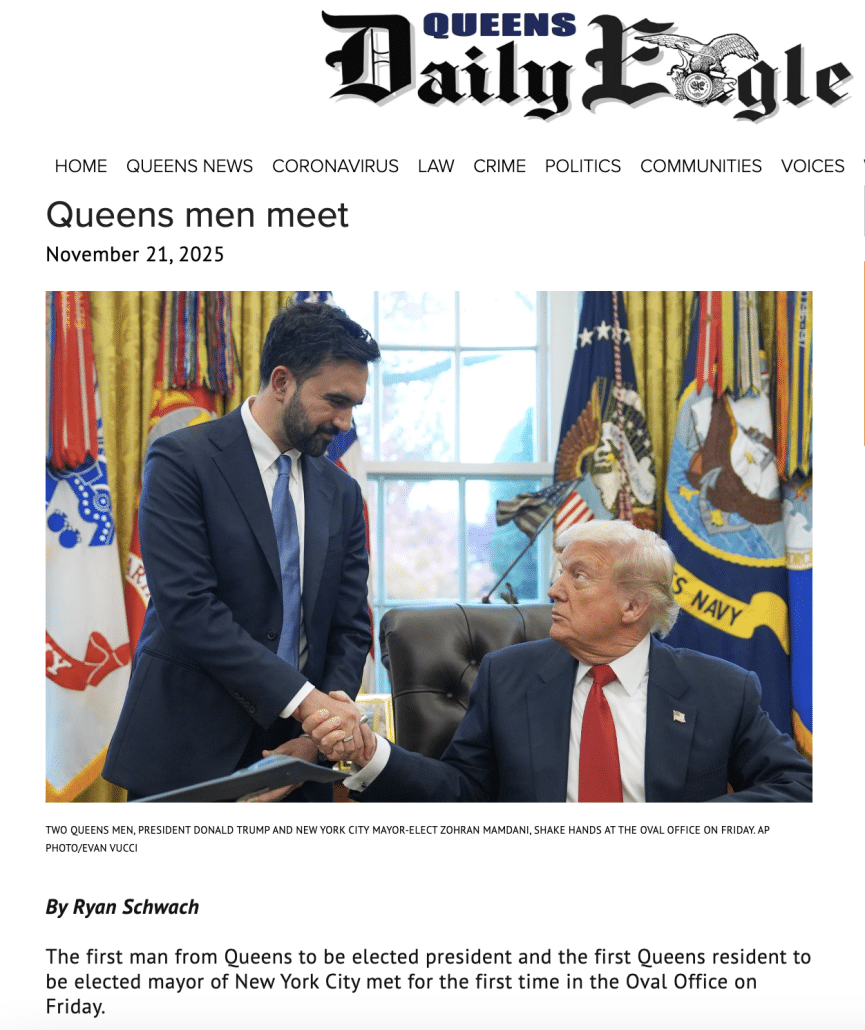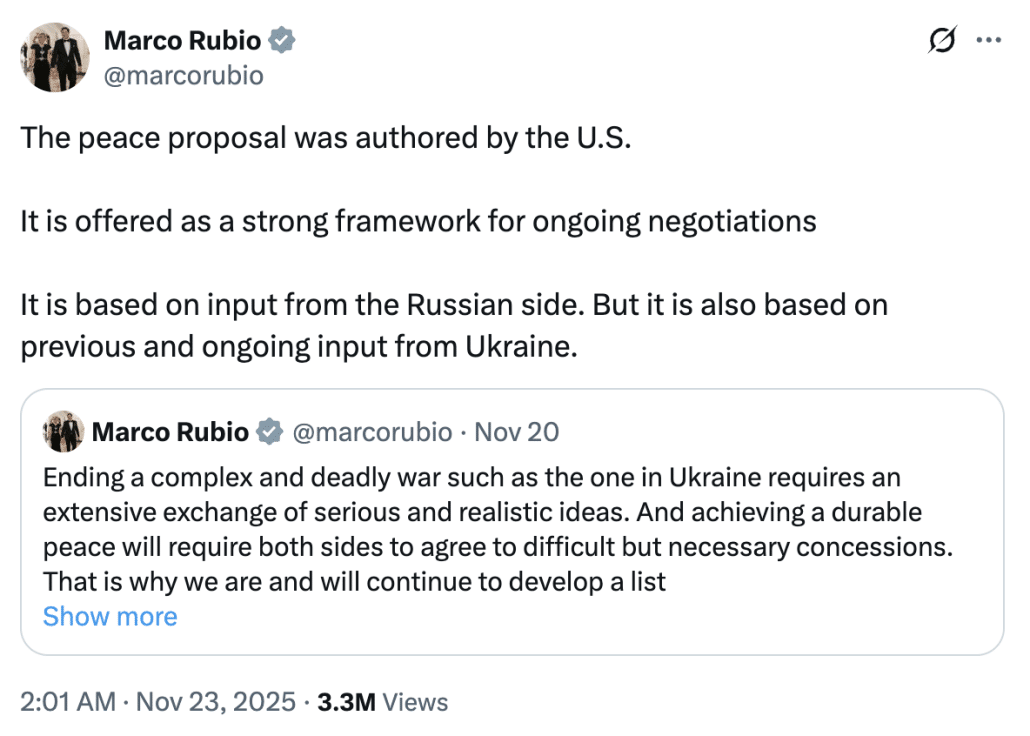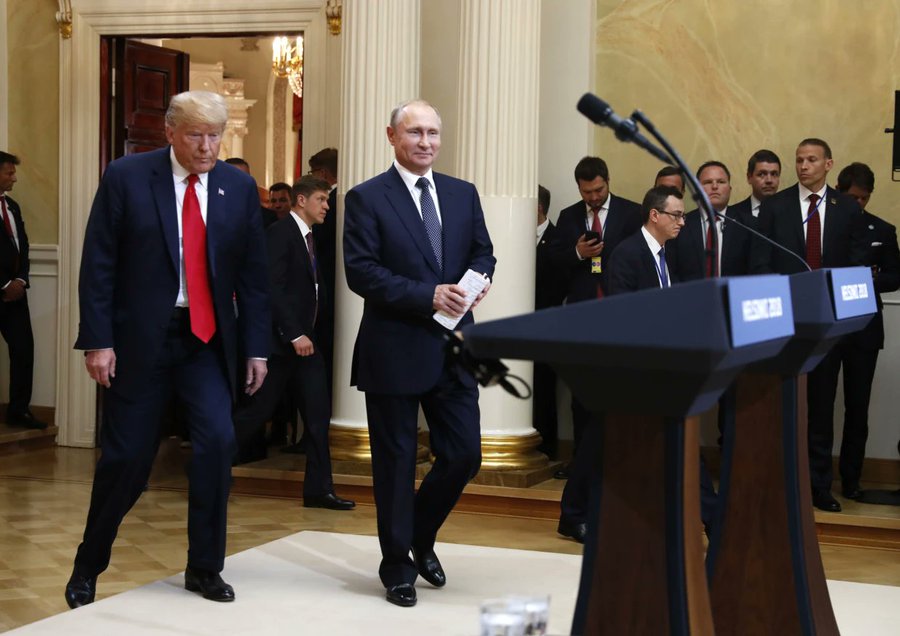Stephen Miller Has Similar Plans for Colombia and Columbia
Laura Jedeed wonders whether Trump is testing out a new kind of colonialism, where you basically issued orders to the corrupt illegitimate authorities, rather than installing the opposition.
Trump and Rubio’s talking points combine into a message intended not for the people of America, but for the heads of state in Cuba, Columbia, [sic] and worldwide. The message itself is simple, elegant, and ugly: do exactly what we say or America will destroy you—not your country, or your economy, or your people, but you, personally. This strategy doesn’t just let America “run” Venezuela. It allows this administration to “run” any country unable to attack us on our home turf: extract their resources, dictate their domestic policy, force their leaders to resign. All by credibly threatening extreme personal violence against any head of state who pushes back.
Credit where credit is due: it’s an entirely new approach to colonialism. Here’s how it’s worked since Britain perfected the art: you invade the country, then place the opposition party in power. That party requires your support to maintain control (if they had enough force to do it themselves they’d already be in charge). In exchange for military backup, their leader will do anything you ask.
Trump, on the other hand, has endorsed Maduro’s Vice President, Delcy Rodríguez, allegedly because the opposition party “doesn’t have the support within, or the respect within the country.” This assertion is aggressive nonsense. Opposition party weakness is a feature, not a bug, for the reasons stated above. It’s also patently untrue in this case. Election monitors from several countries agree that candidate Edmundo González Urrutia beat Maduro in a landslide two years ago by as much as 51 percent. Trump and his allies know this—they’ve used Maduro’s election theft to justify invasion. It’s kind of perfect: the party doesn’t have the power to gain power by themselves, but they’re popular enough to minimize the danger of revolt. It’s the dream situation—so why isn’t the Trump administration going for it?
Most people seem to think Trump’s endorsement of the unpopular and hostile Rodríguez stems from bitterness towards María Corina Machado, the opposition party leader who received the Nobel Peace Prize that Trump wanted so badly last year. Machado seems to think so too; she’s offered to give the prize to Trump and spent ten minutes abasing herself before the Peace President on Hannity yesterday. It won’t help. Trump is petty to the core, it’s true, but Stephen Miller and the other ghouls actually running this country would never set the entire colonial playbook on fire just to appease some old queen’s ego.
The real reason, I suspect, is this: leaving Rodríguez in charge is the only move that does not require a full-scale invasion.
Unlike Machado, Rodríguez possesses a military and police force capable of holding Venezuela together. Under the old model, that force would have threatened our hegemony, but under Colonialism 2.0, she has a strong incentive to do exactly as she’s told regardless; she is, after all, one surgical strike away from losing her freedom or possibly her life. As long as she doesn’t call Trump’s bluff or get coup’d herself, it’s foolproof.
[snip]
And the administration was right: Rodríguez is already rolling over. “We consider it a priority to move towards a balanced and respectful relationship between the US and Venezuela,” she wrote on Telegram late Sunday. “We extend an invitation to the US government to work together on an agenda for cooperation that is aimed towards shared development.” So far, so good.
That’s certainly what Trump is trying to do.
But it’s wildly premature to assess whether it’ll work.
Before I explain how it may backfire, let me observe that this plan is precisely the same plan Trump (Stephen Miller, really) is attempting with the US.
What Trump plans for Colombia is little different than what he succeeded in doing with Columbia University: Make demands on the elected leader, extract tribute, change the rules to benefit the authoritarian state. Whether it will work long term has yet to be seen, but the lesson of New College in Florida shows where things may head in the medium term: with dramatically increased costs and noticeably decreased utility. Once DeSantis is out of power, the effort is likely to be abandoned, turning New College into a bigger shell than it is already is. Columbia might take longer to collapse, unless Stephen Miller doubles down on his demands.
Now consider what makes Venezuela (or Colombia) different from Columbia, starting with the guns, guns which might come from at least three different places.
First, there are Russia, China, and some other Venezuelan patron states that are under assault as well. Trump has ordered Venezuela to expel them, stop doing business with them, and sell oil only to the US.
The Trump administration has told Venezuela’s interim president Delcy Rodriguez that the regime must meet the White House’s demands before being allowed to pump more oil, according to three people familiar with the administration’s plan.
First, the country must kick out China, Russia, Iran, and Cuba and sever economic ties, the sources said. Second, Venezuela must agree to partner exclusively with the U.S. on oil production and favor America when selling heavy crude oil, they added.
According to one person, Secretary of State Marco Rubio told lawmakers in a private briefing on Monday that he believes the U.S. can force Venezuela’s hand because its existing oil tankers are full. Rubio also told lawmakers that the U.S. estimates that Caracas has only a couple of weeks before it will become financially insolvent without the sale of its oil reserves.
As we speak, the Trump Administration is carrying out a replay of the OJ White Bronco chase, but with an empty oil tanker headed for Russia.
Russia has sent a submarine and other naval assets to escort an empty, rusting oil tanker that has become a new flashpoint in U.S.-Russia relations, according to a U.S. official.
The tanker, formerly known as the Bella 1, has been trying to evade the U.S. blockade of sanctioned oil tankers near Venezuela for more than two weeks. The vessel failed to dock in Venezuela and load with oil. Although the ship is empty, the U.S. Coast Guard has pursued it into the Atlantic in a bid to crack down on a fleet of tankers that ferry illicit oil around the world, including black-market oil sold by Russia.
The vessel’s crew repelled an effort by the U.S. to board the vessel in December and steamed into the Atlantic. As the Coast Guard followed it, the crew sloppily painted a Russian flag on its side, changed its name to the Marinera and switched its registration to Russia.
Russia has been concerned by U.S. seizures of tankers that ferry its illicit oil around the world and power its economy, and it has made the unusual move of allowing the tanker to register in Russia without an inspection or other formalities, experts say.
Update: The US has now seized the tanker.
Will this lead to some kind of direct conflict? I have no fucking clue and neither do you, because both Trump and Putin are fucking nuts. If Trump were rational, he’d retaliate not with direct confrontation in the North Sea, but by arming Ukraine and giving them the green light to up its attacks on Russia, but he’s not rational. Russia’s economy is actually close to collapse, and it wouldn’t take much to get it there. Russia, of course, has other means it might use to retaliate against Trump.
We shall see.
China is another matter though. China not only is rational, but China kicked the shit out of Trump in his last attempt to demand obeisance, the tariffs. Trump thought he could achieve with tariffs what he is trying to achieve with Venezuela: obeisance and personal tribute. Not only have all the tariffs harmed the US, spiking small business bankruptcies and inflation (and in the process making Trump’s political support far weaker), but China used its near-monopoly on rare earths and ability to replace US soybeans to bring Trump to his knees instead.
In fact, the Venezuelan coup might be partly a response to China’s success at wielding the rare earth weapon. While there’s much I disagree with in it, this post argues the Venezuela invasion was not about oil, but about the rare earth China currently extracts.
Investigative reporting documented Chinese buyers operating directly at mining sites in Bolívar state. The Venezuelan government established official collection centers in Los Pijiguaos and Morichalito in 2023 specifically for cassiterite, coltan, nickel, rhodium, and titanium. The Maduro regime designated these as strategic resources for commercialization, meaning state control over extraction and export, with Chinese buyers integrated into official operations from the start.
The supply chain from Venezuelan mines to Chinese refineries operates through both formal and informal channels, with Chinese buyers exercising operational control at the extraction source. Minerals extracted in the Orinoco Arc move by river and air transport to Colombian border towns, then to Bogotá for smelting into refined bars. These materials are relabeled under incorrect tariff codes, transforming raw ore into processed ferro-tantalum or other classifications that obscure origin. Final export occurs through Colombian ports at Santa Marta and Buenaventura, destined for Chinese processing facilities.
Once Venezuelan minerals blend with Colombian or Brazilian ore in these intermediary steps, tracing origin becomes effectively impossible. This laundering mechanism allows Venezuelan minerals to enter legitimate global supply chains, including those feeding US defense contractors. The result is Pentagon weapons systems potentially incorporating materials extracted under Chinese buyer supervision in Venezuelan territory, then processed in Chinese refineries controlled by Beijing.
Chinese buyers do not operate at arm’s length through market transactions. They coordinate directly at the mining sites with both Colombian guerrilla groups (ELN, FARC dissidents) who control physical security and Venezuelan state security (SEBIN) who facilitate transport using official government vehicles. One miner described seeing Chinese operatives and ELN commanders “eating together, buying material together, and getting off the helicopter together.” This is not commercial activity. This is integrated operational control where Chinese buyers work directly with armed groups and state officials to extract strategic minerals.
Trump doesn’t need — indeed, the oil companies probably don’t want — Venezuela’s oil, at least not in the short term.
He does need rare earth deposits (which is also the stated purpose of usurping Greenlands).
It took us some months to understand how China responded to Trump’s threat of tariffs. It took less time to recognize China’s advance preparation for them (based on Trump’s trade war from the first term).
A lot of the coverage of the coup views it as a profound humiliation for China, not least because China’s Latin American envoy met with Nicolás Maduro the day before the coup. That didn’t stop China (and Russia and Iran) from attending Rodríguez’ signing in, so there’s a distinct possibility they’re in at least as close coordination with Rodríguez right now as Marco Rubio.
But the most belligerent thing — the thing people expect — is that China will take Taiwan, as it was practicing to do even as Trump had a fifth of deployed assets in the Caribbean preparing to invade.
With all the attention on Venezuela, there has been too little attention on vacuums created with this extended deployment off the coast of Venezuela (the most immediate of which is probably in the Middle East). But it is clear that Trump keeps launching little wars with resources most of Congress believes should be used to counter China’s expansionary plans.
But as China showed with the tariffs, they likely have ways to respond that are less direct and at least as devastating.
But China and Russia aren’t the only ones who have guns here.
So does, just as one example, Interior Minister Diosdado Cabello, who has been indicted in SDNY alongside Maduro since 2020. Reuters describes that the US already threatened Cabello.
In the meantime, they have communicated to Cabello via intermediaries that if he is defiant, he could face a similar fate to Maduro, the authoritarian leader captured in a U.S. raid on Saturday and whisked away to New York to face prosecution on “narco-terrorism” charges, or could see his life in danger, the source said.
But taking out Cabello could be risky, possibly motivating pro-government motorcycle groups, known as colectivos, to take to the streets, unleashing the chaos Washington wants to avoid. Their reaction may depend on whether they feel protected by other officials, however.
In one of her first decisions as acting president, Rodríguez appointed General Gustavo González López as new head of the Presidential Honor Guard and the Directorate General of Military Counterintelligence (DGCIM), state TV said late on Tuesday.
González López, who has been sanctioned by the U.S. and EU along with at least half a dozen other high-ranking officials for rights violations and corruption, served as Venezuela’s intelligence director until mid-2024, when he was replaced by Maduro in a reshuffle of his cabinet and security team.
Later that year, he began working with Rodríguez as head of strategic affairs and control at state oil company PDVSA.
González López was considered close to Cabello, but it was not immediately clear whether his appointment was a gesture of support from Rodríguez to the man considered the strongman of the ruling party, or, on the contrary, a sign of a rift.
The officer replaces General Javier Marcano, whose performance came under scrutiny after Maduro’s capture, according to analysts.
One thing I’ve seen no coverage of is why the US thinks Rodríguez will be secure within Venezuela now that Trump killed the 40 Cubans who were protecting Maduro. And the militias via which Cabello exercises some of his repression could carry out a deniable kind of violence.
But Cabello isn’t even the only one with guns in question. The purported purpose of this operation is about stopping drug trafficking. But unless Trump is doing what every other caudillo does — manage the trade while extracting tribute — there will, eventually, be a counter response from the cartels, which don’t take kindly to losing their markets and have the ability to exercise violence both on site — in Venezuela — but also closer to home, including in the United States. Stephen Miller has so much of US law enforcement snatching workers at Home Depot that certain kinds of crime are likely far easier to pull off. Update: About which the NYT has another story today.
Finally, there are the Venezuelan people. Maduro only remained in power with a great deal of repression, and Trump is tinkering with that system of repression. Meanwhile, Trump’s plans to expel much of the Chinese may exacerbate already dire economic conditions for Venezuelans, because Trump won’t subsidize soft power in the way China has been willing to (to say nothing of the expulsion of Cubans who were providing medical care). Where Stephen Miller’s authoritarianism has failed most dramatically in the US is the way the counter reaction to his goons has revitalized civil society in cities that stand up to the goons. And there’s already a practiced opposition in Venezuela that, as in the US, dramatically outnumbers the goons in charge.
It’s only day four. We have no fucking idea how this will turn out. While Delta Force and the CIA performed spectacularly, there’s really just a handful of people in charge, and most — like Stephen Miller, who thinks of Venezuela as an island surrounded by a US armada and therefore is likely forgetting about a porous border with Colombia — are utterly ignorant about Venezuela and childish about power.
Columbia University was easy to subjugate, because no one had guns. But even there it only happened by damaging the host. There are a lot of people with guns with an interest in Venezuela.
It’s just as likely, in my opinion, that this precipitates World War III as that it succeeds in Venezuela much less produces the treasure Trump is demanding.
Update: CEO of the Human Rights Foundation, Venezuelan Thor Halvorssen, predicts Delcy Rodríguez’ quick demise.
Reports indicate the Trump administration has struck a deal with Delcy Rodríguez, Mr. Maduro’s iron-fisted vice president, positioning her as a transitional leader. She has, it seems, convinced U.S. officials that she can dismantle the Maduro dictatorship, which would have to include demobilizing the armed militias, disbanding the dreaded secret police and ending the regime’s drug empire. But this is a fantasy. Ms. Rodríguez will fail spectacularly, leading to the final unraveling.
Venezuela isn’t like Mexico, where a state coexists uneasily with cartels. Here, the cartel is the state. Factions—enriched generals, intelligence chiefs and narco-traffickers—won’t surrender power in a Washington-brokered deal. Ms. Rodríguez herself faces insurmountable obstacles, beginning with her utter lack of legitimacy. Never elected vice president, she has less authority than Mr. Maduro, the usurper who appointed her.
I think he wildly overestimates the extent that Trump would even permit any lapse in repression.
Update: Meanwhile on Xitter, I take this as confession that Stephen Miller knows fuckall about the oil market, especially the discount at which Venezuelan oil must be sold and the price at which it is worth drilling.
Paul Krugman’s column today is on how Trump’s oil math doesn’t add up.
[W]hatever it is we’re doing in Venezuela isn’t really a war for oil. It is, instead, a war for oil fantasies. The vast wealth Trump imagines is waiting there to be taken doesn’t exist.
Update: WSJ goes into more depth about the challenges Cabello may pose to Trump’s plans.
Fond of swinging a spiked club while spouting conspiracy theories on his hourslong weekly show on state television called “Bringing Down the Hammer,” now on its 556th episode, Cabello is hard to predict.
Cabello, a 62-year-old whose official title is minister of interior, justice and peace, has so far signaled unity, taking part in Rodriguez’s swearing-in ceremony on Monday, where various factions of Venezuela’s ruling socialist party were present.
But that night, Cabello was toting a rifle and riling up black-uniformed security forces before they patrolled Caracas to prevent citizens from protesting.
“Doubting is treason!” he said, before telling the armed group, “Now, off to battle in the streets for victory.”
Under a state of emergency that the government declared after Maduro’s capture, security forces were ordered to hunt down U.S. sympathizers, according to the Official Gazette, where the Venezuelan government publishes new laws and decrees. Residents in the capital reported new roadblocks around the city where armed, masked men checked the phones of ordinary Venezuelans for antigovernment messages.
Update: This offers a good explanation of all the people with guns who would make things difficult even if Delcy Rodríguez did want to cooperate with the US.
Update, January 9: This analysis lays out the difficulties of Delcy Rodriguez’ position better than I did.
For her part, Rodríguez confronts an unprecedented challenge for a Venezuelan leader: She must satisfy Washington’s demands while maintaining sufficient Chavista coalition support to prevent an internal fracture or a military coup. The Trump administration demands sufficient cooperation to enable US oil company operations, likely including transparent property contracts and regulatory stability—precisely the institutional environment that Chavismo systematically dismantled. Rodríguez making such an agreement with Trump would alienate the regime’s hardliners, who would view her accommodation as a betrayal. Thus, Rodríguez may be unable to guarantee the stability required for the business operations Trump wants to run in Venezuela.
Her public contradictions reflect this impossible position. In her first televised addresses as interim president, she demanded Maduro’s immediate release to demonstrate loyalty to domestic audiences. Less than twenty-four hours later, however, she declared it a priority to move toward a “balanced and respectful” economic cooperation between the United States and Venezuela.
This double game cannot persist indefinitely. Rodríguez must choose between accommodating Trump’s demands or preserving Chavista unity. Trump’s threat that if Rodríguez “doesn’t do what’s right, she is going to pay a very big price, probably bigger than Maduro” makes clear that there will be consequences of noncompliance. Purging the hardliners may be Rodríguez’s best option.
Perhaps Rodríguez’s most complex challenge is managing Venezuela’s deep entanglements with China, Russia, Iran, and Cuba while simultaneously partnering with the Trump administration. This is especially the case after the Trump administration demanded that Venezuela immediately cut ties and cease intelligence cooperation with Russia, China, Iran, and Cuba. These relationships represent more than diplomatic alignments—they constitute binding financial obligations, operational dependencies, and strategic commitments that cannot simply be abandoned without triggering massive economic and security consequences.
China presents the most significant financial exposure. Venezuela owes Beijing around twenty billion dollars in loans. These debts are secured through oil-for-loan arrangements that require repayment through crude deliveries, with China currently absorbing more than half of Venezuela’s oil exports (approximately 746,000 barrels per day in November 2025).
Beyond petroleum, Chinese state enterprises control critical Venezuelan infrastructure.


